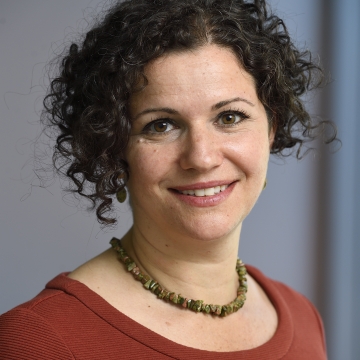MSPH in Human Nutrition – Dietitian
Offered By: Department of International Health
Onsite | Full-Time | 19 months
About the MSPH in Human Nutrition – Dietitian Program
The MSPH in International Health (Human Nutrition – Dietitian) program is a partnership between the Johns Hopkins Bloomberg School of Public Health and the Dietetics Education Program at the Johns Hopkins Bayview Medical Center. This MSPH option offers students interested in nutrition the opportunity to earn both the MSPH degree in Human Nutrition and complete a 38-week dietetic practicum in public health nutrition in preparation for obtaining the Registered Dietitian credential. The full-time program accepts a maximum of ten students annually.
This program is accredited by the Accreditation Council for Education in Nutrition and Dietetics (ACEND), the accrediting agency for the Academy of Nutrition and Dietetics, as a Graduate Program.
This is a STEM designated program. Eligible F-1 visa students can receive an additional 24 months of work authorization, beyond the initial 12 months of post-completion Optional Practical Training (OPT).
Mission of the MSPH in IH (Human Nutrition – Dietitian) Program
The program is consistent with the missions within Johns Hopkins Medicine:
- To provide a seamless dietetics education program that includes the foundations of public health nutrition and comprehensive dietetics training in preparation for graduates to become skilled entry-level public health Registered Dietitian Nutritionists;
- To provide the highest quality training in the field of nutrition and dietetics through a strong, interdisciplinary training team;
- To promote the development of dietetic professionals who are able to embrace proven theory, evaluate current research, and communicate effectively to other health professionals, peers, and the lay population.
Accreditation and Additional Information
The Johns Hopkins University/Johns Hopkins Bayview Medical Center’s Graduate Program is accredited by the Accreditation Council for Education in Nutrition and Dietetics of the Academy of Nutrition and Dietetics 120 South Riverside Plaza, Suite 2190 Chicago, IL 60606-6995, (312) 899-0040 ext 5400. Http://www.eatrightpro.org/ACEND.
Effective January 1, 2024, the Commission on Dietetic Registration (CDR) requires a minimum of a master’s degree to be eligible to take the credentialing exam to become a registered dietitian nutritionist (RDN). In addition, CDR requires that individuals complete coursework and supervised practice in program(s) accredited by the Accreditation Council for Education in Nutrition and Dietetics (ACEND). During the ACEND accredited Graduate Program, students will complete didactic and experiential learning. The curriculum is guided with competencies and performance indicators that can be found here ACEND. For information on the requirements and process pathways to become a registered dietitian, visit Academy of Nutrition and Dietetics website. Graduates who successfully complete the ACEND-accredited Graduate Program at Johns Hopkins Bloomberg School of Public Health are eligible to apply to take the CDR credentialing exam to become a Registered Dietitian Nutritionist.
While state interpretations of statutes may vary, it is ACEND's considered opinion that the program meets the educational requirements for dietetics licensure and certification in all states. However, completing an ACEND-accredited academic program alone does not qualify an individual for licensure or certification as a dietitian in any state. Individuals should review their state's licensing statutes and regulations to understand the specific requirements, including supervised practice and examinations, needed to obtain a dietetics license. More information about state licensure and certification can be found on the CDR's website. The State of Maryland does require licensure to practice as a Registered Dietitian Nutritionist and information can be found here Maryland Department of Health Licensure.
For more specific information regarding this program contact Ms. Marcy Kane, MBA, RD, LDN, the MSPH in IH (Human Nutrition – Dietitian) Program Director and Manager of Nutrition Education and Research for the Johns Hopkins Bayview Medical Center (mkane9@jhmi.edu), Dr. Laura Caulfield (lcaulfi1@jhu.edu), Professor & MSPH in IH (Human Nutrition – Dietitian) Program Advisor and Academic Lead for Human Nutrition at (410) 955-2786; or Ms. Cristina Salazar, MA (csalazar@jhu.edu), Academic and Student Matters Director for the Department of International Health.
Frequently Asked Questions about the MSPH in International Health, Human Nutrition – Dietitian program.
MSPH in Human Nutrition – Dietitian Program Highlights
What Can You Do With a Human Nutrition – Dietitian Graduate Degree?
The 19-month graduate-level education program offers students the opportunity to earn both the MSPH degree in Human Nutrition and complete a 38-week dietetic practicum to qualify them to sit for the Commission on Dietetics Registration Exam for Dietitian Nutritionists.
Sample Careers
- Public Health Dietitian
- Program Specialist
- Research Dietitian
- Clinical Dietitian
- Nutrition Specialist
Program Completion Rate and Pass Rate on the RD Exam
- The MSPH in International Health (Human Nutrition – Dietitian) program has maintained a 98-percent completion rate since its inception in 2007, and 100% of graduates have passed the RD exam.
- Additional outcome data is available upon request.
Curriculum for the MSPH in Human Nutrition – Dietitian
Students are guided through a seamless dietetics education program that includes the foundations of public health nutrition and comprehensive dietetics training in preparation for graduates to become skilled entry-level public health Registered Dietitian Nutritionists.
In the dietetics practicum, which follows completion of the MSPH course work, students complete the following:
- Clinical, and food service rotations at the Johns Hopkins Bayview Medical Center and the Johns Hopkins Hospital, including the Johns Hopkins Children's Center. Rotations may periodically be scheduled at other Johns Hopkins affiliates in the Baltimore–Washington, DC, region area.
- Community rotations at sites in the Baltimore area.
- An 8-week self-selected public health rotation with a public health program or organization focused on public health, with offices located within the continental U.S. or its territories, such as USDA or WIC. This individualized rotation is developed to suit the student's career interests (e.g., humanitarian assistance, international nutrition, nutrition communications, population research, clinical investigation). Assistance is available for selection of this rotation site. The student is responsible for any costs incurred with their domestic or international 8-week self-selected public health rotation.

Courses Available in the Following Areas:
- Clinical nutrition
- Human nutrition
- Dietetics
Admissions Requirements
For general admissions requirements, please visit the How to Apply page. This specific program also requires:
Prior Coursework
Students must either (1) hold a DPD verification statement from an ACEND accredited program or (2) meet the bachelor's degree requirement and the prerequisite course requirements as described below. Prerequisite courses must be completed at the undergraduate level or higher and must be completed prior to enrollment in the MSPH Human Nutrition – Dietitian Graduate Program. Courses and transcripts to meet these requirements will be reviewed and approved by the University and program staff. Only applications with two or fewer prerequisites pending for the spring/summer following application will be considered for admission. Courses currently enrolled in at the time of application are not considered pending.
7 prerequisite courses: anatomy and physiology (2 semesters); organic chemistry, biochemistry, psychology or counseling skills; introductory nutrition (3 credits minimum); advanced nutrition (defined as a class that has the introductory nutrition class as a prerequisite, 3 credits minimum. Please contact Marcy Kane, MBA, RD, LDN, Program Director (mkane9@jhmi.edu) or Elisabeth Simmons, Med, Academic Program Manager, (IHAdmissions@jh.edu) for review of prerequisite acceptability.
Standardized Test Scores
Standardized test scores (GRE) are optional for this program. The admissions committee will make no assumptions if a standardized test score is omitted from an application, but will require evidence of quantitative/analytical ability through other application components such as academic transcripts and/or supplemental questions. Applications will be reviewed holistically based on all application components.
Program Faculty Spotlight

Laura Caulfield, PhD, researches nutrition problems affecting maternal, infant, and child health in the United States and globally.

Kerry Schulze, PhD ’03, MS, studies micronutrient status biomarkers, particularly for mothers, infants, children, and adolescents in nutritionally compromised populations.

Julia Wolfson, PhD '16, MPP, studies individual, structural, and policy factors that influence food choices, diet quality, and diet-related health outcomes.

Yeeli Mui, PhD '17, MPH, uses systems science and urban planning tools to tackle the often invisible drivers of food insecurity and health inequities.
Tuition and Funding
The Master’s Tuition Scholarship is available to students in good academic standing in a two-year, full-time master’s program. The MTS is a 75% reduction in tuition for year two of an eight-term program.
Additionally, Johns Hopkins University, thanks to support from Bloomberg Philanthropies, offers need-based scholarships for students enrolled in an MSPH program. These need-based scholarships, which cover up to 50% of tuition costs in the first year of study, will enable the best and brightest students with an interest in public health to obtain the highest-quality professional public health education available. Students who are first-generation graduate students, and have exceptional undergraduate academic records, will be prioritized for this need-based scholarship.
To be considered for an MSPH need-based scholarship, applicants should submit their DICAS application and supporting documents by the December 1 application deadline, along with the CSS profile to the Financial Aid Office using code 5315 no later than March 1. Applicants should indicate their interest in the scholarship by answering the questions in the DICAS Supplemental Questions Form.
For up-to-date information of tuition, fees, and financial aid, visit the School's Tuition and Fees page.
Additional Fees, Expenses, and Requirements
In addition to the tuition requirements for the professional MSPH degree, students accepted to the Human Nutrition – Dietitian track must pay the $10,000 clinical training fee by September 1 of their second academic year. There are some incidental costs specific to the training as well, including the items with estimates below :
| Health insurance (for the duration of the 38-week practicum) | Varies |
| Car insurance (only if using one for travel to and from rotations during the practicum for the duration of the 38-week practicum) | Varies |
| Safety shoes | $50 |
| AND Student Membership (for the duration of the 38-week practicum) | $58 |
| Nutrition-Focused Physical Exam Pocket Guide, 3rd Ed. Beth Modarski, RDN, LD | $25 |
In order to begin the program, all students are required to undergo and pass a criminal background check and drug screening, have TB test clearance, provide proof of immunizations and have a physical exam performed at the Johns Hopkins Bayview Medical (JHBMC) Center Occupational Health Department. The student will follow the Johns Hopkins Medicine policies and procedures relating to vaccines and use of personal protection equipment. Clearance to begin the program will be determined by the Johns Hopkins Bayview Medical Center Human Resources and Occupational Health Departments. The criminal background check, drug screening, TB test performed at JHBMC, physical exam and annual mandatory vaccines are provided at no cost to the student.
Contact Us
Questions about the program? We're happy to help.
Email: IHAdmissions@jhu.edu
